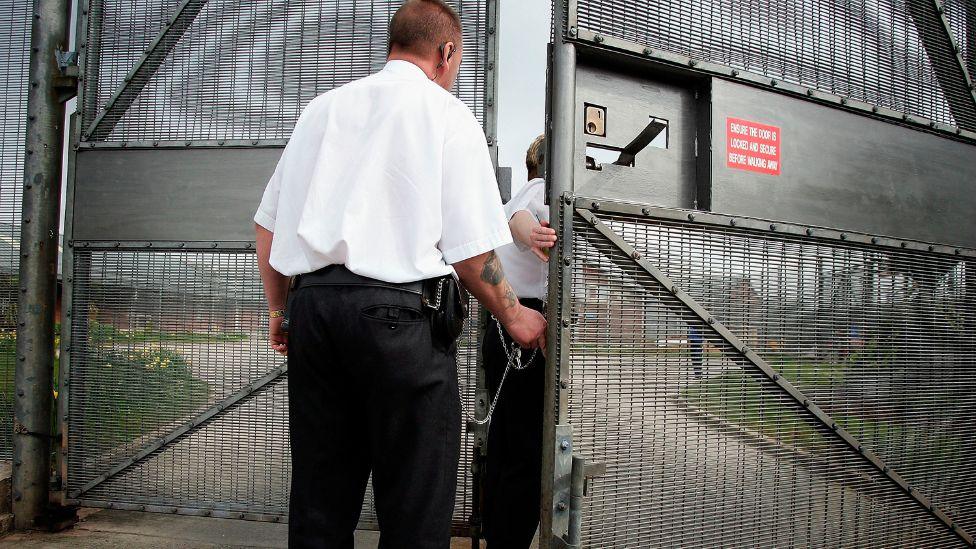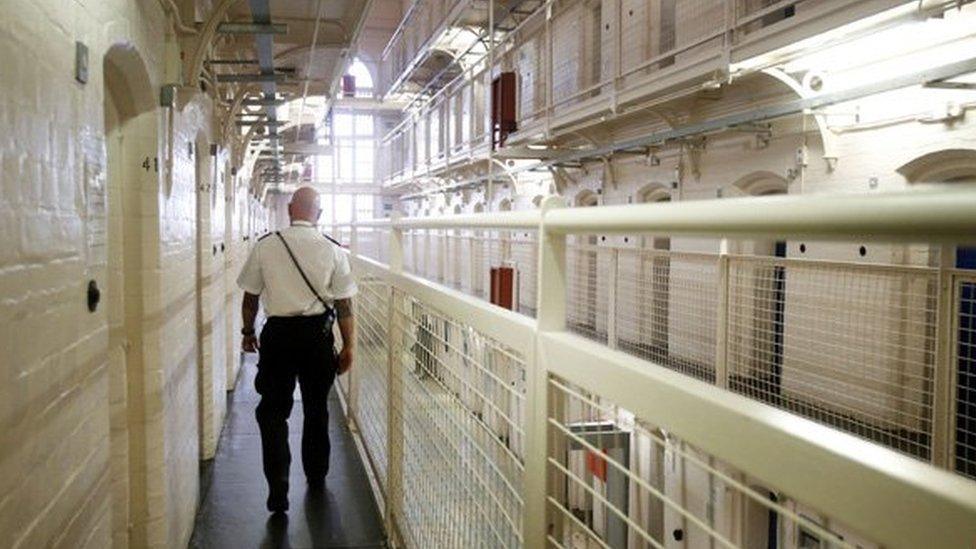Bail reforms pass despite concern from victims groups
- Published

The Scottish government plans are designed to help reduce the number of prisoners on remand
MSPs have backed Scottish government plans aimed at reducing reoffending and cutting the prison population.
The Bail and Release from Custody (Scotland) Bill was designed to ensure people are only remanded in custody as a last resort.
Victims' groups had urged MSPs to oppose the reforms, warning they could lead to repeat offenders being released on bail.
It was passed at Holyrood with 66 votes in favour and 44 opposed.
The legislation will prevent offenders from being freed from prison on Fridays, or the day before public holidays, to help ensure they can access support upon their release.
It will make changes to the bail system used to decide if people should be kept in custody ahead of trial and include a provision that courts would have to record the reasons why bail has been refused.
And it will enable sheriffs and judges to reduce any prison sentence that is imposed by one day for every two days an offender spent on bail subject to electronic tagging.
Justice Secretary Angela Constance said the bill would help tackle Scotland's historically high remand rate.
As of April, 28% of the country's prison population was on remand, with 24% awaiting trial and 4% convicted and awaiting sentence, according to figures published by the Scottish Public Health Observatory.
Scotland also has one of the highest imprisonment rates in western Europe, external.

Justice Secretary Angela Constance says the bill would help reduce the number of prisoners on remand
Yet domestic abuse groups warned the legislation could lead repeat offenders to be released on bail, while concerns were raised over whether justice social work is properly resourced.
Scottish Women's Aid, Victim Support Scotland and domestic abuse advocacy and support service Assist had urged MSPs to vote down the bill.
The proposed legislation would repeal Section 23D of the Criminal Procedure (Scotland) Act 1995, which sets out a presumption against bail for those accused of violent, sexual, and/or domestic abuse offences in solemn proceedings, where they have a previous conviction of a similar nature.
The bill instead sets out new provisions that remanding a person in custody should be "reserved only for those that pose a risk of serious harm". It added that remand should be limited to "reasons related to the protection of public safety (including victim safety) and protecting the delivery of justice".
However, Scottish Women's Aid voiced concerns , externalthe reforms could lead to "convicted repeat and serial abusers" being granted bail, allowing them to remain in the community.
Senior judge Lord Carloway also said, external the bill would slow down court processes, lead to people being "detained unnecessarily", lead to more errors and increase the "burden" on sheriffs and court staff.
Scottish Women's Aid backed an amendment proposed by Scottish Tory justice spokesperson Jamie Greene which called for Section 23D to remain in the legislation. His proposal was rejected by MSPs.

Scottish Tory MSP Jamie Greene's amendment was rejected by MSPs
At the stage three debate on Thursday, Mr Greene called Section 23D a "vital safeguard for victims of domestic abuse" and said the voices of support charities had been "shut down" by the government.
He told MSPs the logic behind the bill was flawed as the high number of prisoners on remand was not the result of bail decisions, but the result of "backlogs" in the justice system.
Justice Secretary Angela Constance insisted the new rules on granting bail will allow courts to remand someone accused of a serious sexual offence or a serious domestic abuse offence, "particularly where there has been a track record of offending".
She added: "As a result of this bill, the type of harm arising from coercive and controlling behaviour is explicitly recognised by the bail test."
'Significant concerns'
The SNP minister also pointed to an amendment passed which emphasised the importance of victim safety information being sought from prosecutors when courts make a bail decision.
A further amendment will require information to be collected on the use of bail in cases previously covered by the presumption of favour of remand.
Labour MSP Katy Clark said her party supported a reduction in the use of remand, alternatives to custody and more justice social work involvement. But she said "significant concerns" raised by victims' groups and the judiciary had not been addressed by the government.
While Tory and Labour MSPs opposed the bill, Lib Dem and Green parliamentarians backed it.
Lib Dem MSP Liam McArthur said the bill "introduces necessary reforms that can help balance the need to address the problems arising from Scotland's high and growing population".
Green MSP Maggie Chapman said the bill was "an important step on the journey towards a fairer and safer Scotland".
- Published13 December 2022

- Published6 September 2022
